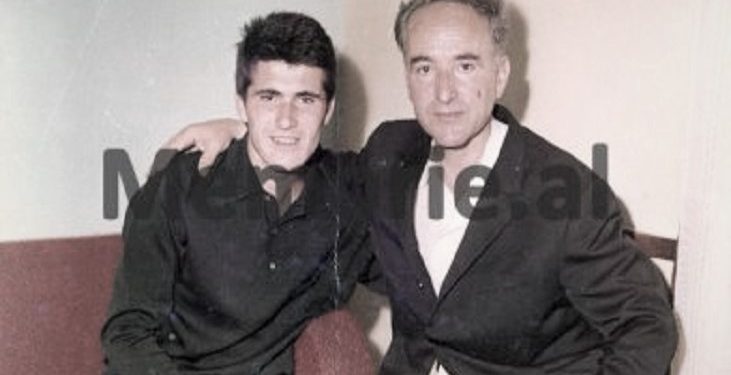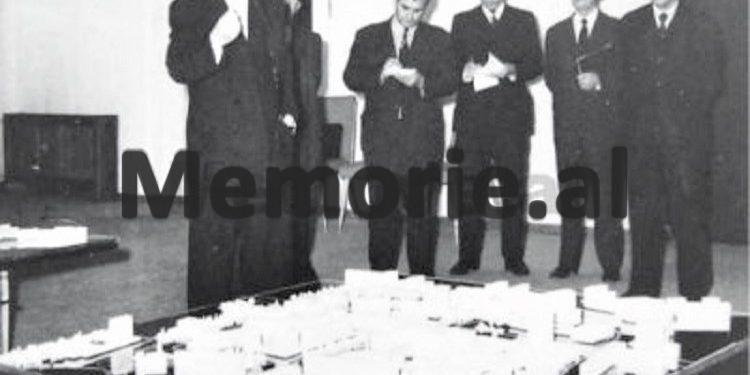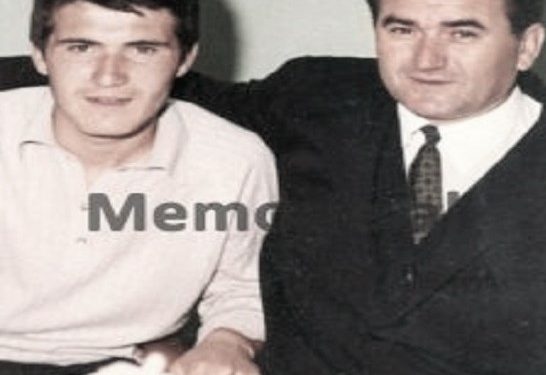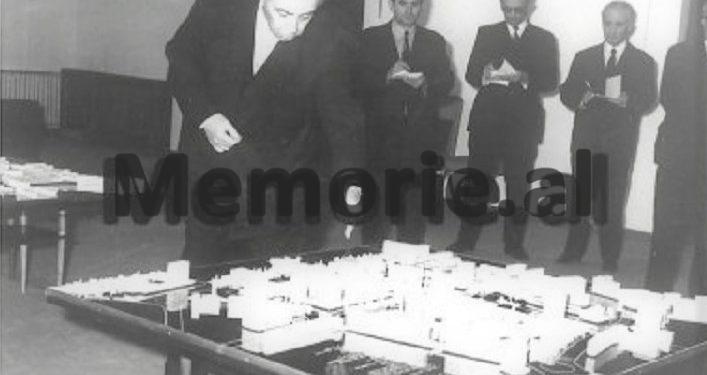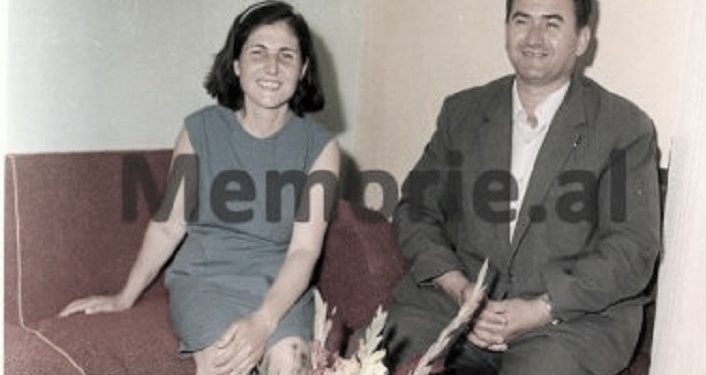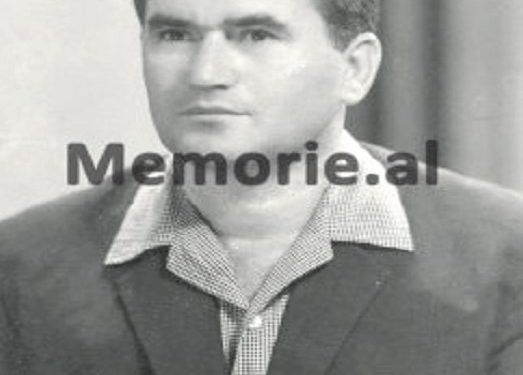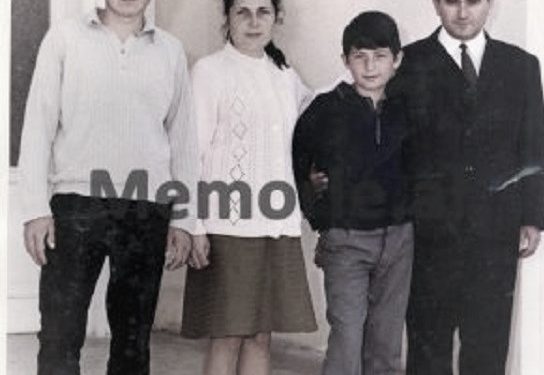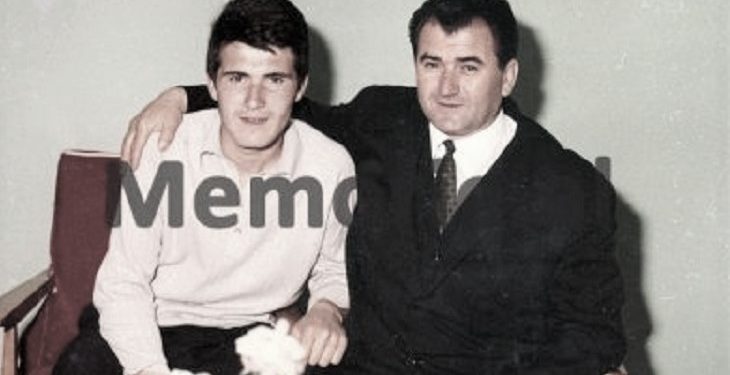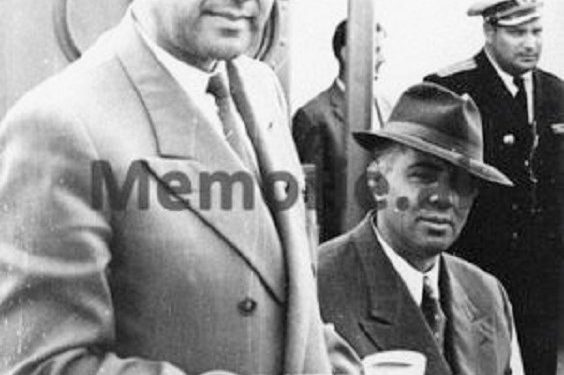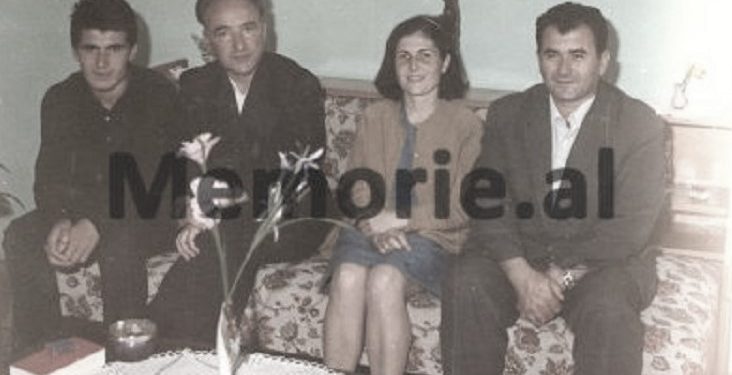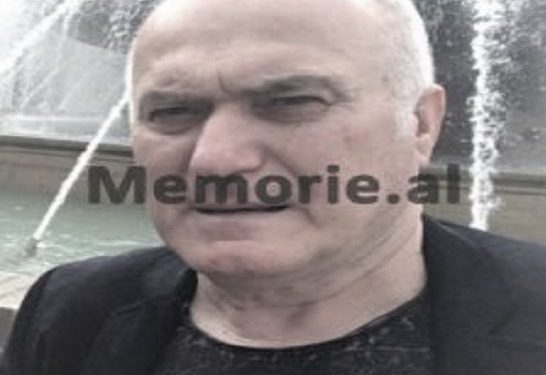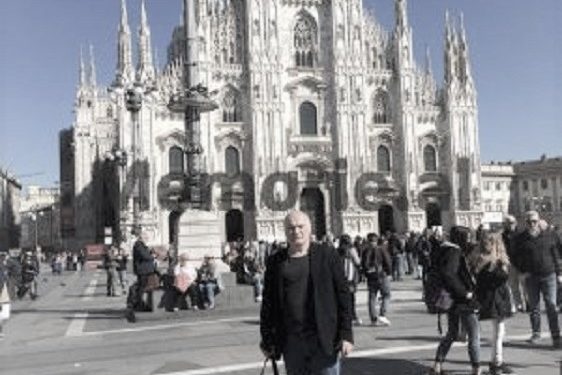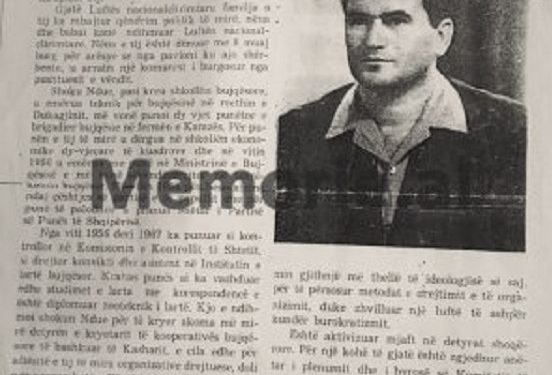Dashnor Kaloçi
Memorie.al/ publishes the unknown story of Ndue Marashi, former Chairman of the Executive Committee of Tirana, member of the People’s Assembly and member of the Central Committee of the ALP, who on December 16, 1975, was found dead by a bullet pistol in one of the rooms of his villa (at the “Red School”), the circumstances of which have not been clarified even today after 45 years ?!
Rare testimony of his son, 61-year-old Xhovalin Marashi who has lived in Belgium for years, who testifies for the first time publicly, the whole unknown story of his father and the Marashi family, starting from: their origin, arrival in Tirana, work, education, graduation and career of Ndue first in Kamza and then in the Kashar cooperative, the Party Committee of the Region no. 4 and then as Chairman of the Executive Committee of Tirana, where he served from 1973 until December 16, 1975, when Xhovalini and his younger brother, Vlash, found their bloodied father in the last minutes of life and the bus that they announced by phone, came after only 45 minutes ?!
Xhovalini’s story about the friendships that their father had with a part of the senior leadership such as: Beqir Balluku, Abdyl Këllezi, Fadil Paçrami and Myslym Peza, or others with lower positions and functions such as: Irakli Bozo, Abedin Çiçi, Mark Dodani, Hazbi Lamçe, Demlush Thaçi, Fadil Lamin, Halim Stërmasi, Ilir Gjylbegu, Panajot Pano, Fatmir Frashëri, Bert Jashari, Miti Dheodhosi etc.
How was Ndue Marash’s execution scheme carried out, who were the people attacking him by the Politburo and the State Security that hired him for his physical elimination and why his son, Xhovalini, rules out that it was done with the knowledge of Enver Hoxha, who is said to be one of the people who loved Ndue very much and he together with Nexhmija and their son, Iliri, have done a lot for the Marashi family, starting from… ?!
After the publication of several articles by Memorie.al in the last two issues, regarding the story of the former Chairman of the Executive Committee of Tirana, member of the Central Committee of the ALP and member of the People’s Assembly, Ndue Marashi, who 45 years ago first, at noon on December 16, 1975, he was found dead in one of the rooms of his villa that is still located today near the “Red School”, where according to the official version, given by the press release that was published the next day in the press, he had committed suicide, Memorie.al returns to this story.
This serious event, which did not go unnoticed even at the time it happened, as we refer to the official version, was the first time after many years that a suicide took place by a senior state official, (we have in mind, in in 1947 Nako Spiron, former Chairman of the State Planning Commission, who ‘de jure’, was the Prime Minister of the country and then in 1956, Omer Nishani, the President of Albania, or as he was called at the time, the Chairman of the Presidium of People’s Assembly), and according to communist morality, as well as the laws in force, suicide was considered a hostile act and the person who did so, especially when in office, was at best considered a “defeatist and capitulator” was labeled as: “traitor and enemy of the people”!
Based on these, Ndue Marashi was not an exception from the communist regime of that time and all the accusations against him as “enemy of the people” etc. fell on him, and his family was expelled from Tirana and persecuted until the collapse of communist regime. Regarding this event and the mysteries that it still carries, it was written only after the ’90s and in 2018, a television documentary was made by the Albanian Public Radio-Television, where family members of Ndue Marashi, gave their related versions with that event.
Given the fact that on December 16, it was 45 years since the day Ndue Marashi lost his life in tragic circumstances and that event still remains shrouded in mystery, Memorie.al was contacted by Mr. Xhovalin Marashi, (Ndue Marashi’s eldest son), who has been living with his family in Belgium for years, who after expressing his thanks to our editorial office for the articles published about his father, was also willing to give a long interview. and exclusive to Memorie.al, making public for the first time, many of the unknown sides of that story related to the name of Ndue Marashi and their family, an interview which we are publishing starting from this issue.
Mr. Xhovalin, about the story of your father, Ndue Marashi, has been written before (after the ’90s), but to have a clearer idea for the readers, at the beginning of this interview, can you Tell me briefly, where is the origin of the Marashi family and when was it settled in Tirana?
The family of our father, Ndue Marashi is originally from Malësia e Shkodrës (Dushman village of Dukagjini) from where in 1933, when her father, Nduja, was born, she left the lands of her ancestors and went down to Shkodra, settling down. at Arra e Madhe near the Church, where a few days later our grandmother’s father-in-law died. After that, based on the fact that from 1930, until that time, Drane’s grandmother had lost six more children (it is said from measles), those of the Church, told her to flee to Tirana, that here she is not luck is on your way ‘! Thus, they came to Tirana and initially they lived in a house on “Ali Baushi” Street, near the “Xhezmi Delli” school.
What did they earn a living with when they settled in Tirana?
My grandmother started working as a cleaner at the Tirana Prison Hospital and worked there as a cleaner until 1943, when she, as a communist, collaborated with the Tirana guerrilla unit, handed over the keys and they opened the door and all the prisoners left. political, (with all the director of the prison, Mark Berisha if I am not mistaken), going to the mountains as partisans. I remember from my grandmother that Ndoc Mazi was with those prisoners, who was later killed with “The Five Heroes of Vig”. For what she did, grandmother Drane was sentenced to eight months in prison and during that time, based on the fact that the family was left without any income, they were helped by the family of Beqir Balluku, the family Zenuni, Kacia, etc. After some time, the father’s family left Tirana and settled in Kamza, where father Nduja, started school and work, making a career, until he rose to the post of Chairman of the Executive Committee of Tirana, in 1973, replaced there Myqerem Fuga.
Before we went there, (that is, as the Chairman of the Executive Committee), where did your father, Ndue Marashi, go to school and work?
My father finished school in Kamza and there he started working for the first time as a worker and brigadier, and during that time he attended high school (Higher Agricultural Institute), by correspondence and started working there as director of dormitories of the Institute and after graduation also served there as lecturer.
So, apart from the grandmother, Dranes, who served in the War and was imprisoned, schooling and working at the Agricultural Institute of Kamza, was like saying “trampolines” that served Ndues to climb the career ladder at that time, to the top post of the Chairman of the Executive Committee of Tirana?
In a way, yes, but in addition, before being appointed to that position, the father worked and had other duties, until he came to head the Executive Committee of Tirana.
Specifically, where?
From Kamza, the father was appointed to the position of Chairman of the Agricultural Cooperative in Kashar, where he initially had a clash with Prime Minister Mehmet Shehu, during a working visit he made to that cooperative at the time (for the work of some horses and cows that Nduja had sold them in Fushë-Krujë and with that income he had bought others, to improve the breed), and from the good work he did there and the successes that the cooperative had, not only in the district of Tirana, but also nationally , my father was brought up in Tirana. During the time that his father was as Chairman of the Kashar Cooperative, he left a good name in all the villages of that area, as at that time he was given the membership cards of the Democratic Front, even to most of those who were considered kulaks in all the villages that the cooperative included. At that time, in 1966 (VII legislature), the father was also elected as a member of the People’s Assembly. After leaving the Kashar Cooperative, he first came as the second secretary of the Party Committee of Region No. 4 (covering the villages) and then the first secretary of that region, where he served until 1973, when he was appointed as Chairman of the Executive Committee of the Tirana district.
Who nominated him for that position?
Prime Minister Mehmet Shehu called him before communicating to him, but initially his father refused, as he recalled the clash he had with him when he was the Chairman of the Kashar Cooperative, where in the presence of all cooperative members and the leadership of that cooperative, Mehmeti had expressed : “Where is the mayor who sold the horses, because I will kill him…” ?! And based on this fact, as well as what was said about the Prime Minister Mehmet Shehu, that is, about his rudeness and behavior with subordinates (cursing and offending them), the father found it difficult to work with him. As far as I know, the matter went to Enver Hoxha, where Nduja complained and only after that meeting, he accepted the task, saying: “I am a soldier of the Party and I will work where the need arises and the homeland.” Thus, the father started working as the Chairman of the Executive Committee of Tirana and at that time, he was also elected a member of the Central Committee of the ALP, without ever being a candidate. So, a statutory rule was broken, which until that time, but as far as we know even later, had not been broken for any other person.
In this rapid ascent of the career ladder, was there any help or support from the father, ie any of the senior leadership that Nduja could have helped in those tasks that he had as cooperative chairman, etc.?
Absolutely no one has helped our father climb the career ladder as far as he got and all this, came only in his work and sweat, the fields and stables of cooperatives, where he left without sunrise and returned home in the late hours of the night. So, in short, only his work and character as an honest and hardworking man climbed him to where he went.
Did Ndue Marashi have no friends from the top leadership at the time?
As a start, I wanted to tell you that the man who loved and supported his father the most, Nduen, was Enver Hoxha and also his family, Nexhmija and Iliri. I cannot deny this and I am obliged to confirm it, although it is already known who Enver Hoxha was, but this is a reality and I cannot stay without saying it publicly.
Before we get into the relations and relations that your father had with the Hoxha family, about which we will dwell extensively below, can you tell us from the rest of the leadership, who were the ones that Ndue Marashi had or considered as his friends?
In parentheses I wanted to tell you that my father, Nduja, was a very simple man and, as they said at the time, “fused with the masses.” So, his comrades and friends were ordinary people, cooperatives and workers, with whom his father, not only did he associate a lot, but he ate bread in the cooperative canteens, just like the cooperatives who work all day in the fields, canals and stables. From this stratum, the father had many close friends who respected and respected him. Many of those who knew him can testify to this, wherever he worked, as there are still many of them living in those villages or in Tirana. While with high ranks of leadership, the father had friendships with only a few officials and personalities, who were connected by work, such as. with Beqir Balluku, Abdyl Këllezi, Fadil Paçrami and Myslym Peza. My father had many friendships with them.
Before we talk about the senior leadership you just mentioned, from ordinary people who said your father had close friends, do you remember any?
Yes definitely, I remember there were, like e.g. Agim Bakia, (furji), Xhelal Troplini, (driver) Xheladin Çoku, (driver) Fat Tufina, (watchmaker), Bashkim Shijaku, (teacher), etc.
What about others, well-known names, with whom he had friendships?
He also had friendships with some other well-known names, such as Myslym Keta, who had a close friend, Irakli Bozon, (prosecutor), who had many friends, Abedin Çiçi, (well-known agronomist) Mark Dodani, ( lieutenant colonel, State Security officer), Hazbi Lamçe (lieutenant colonel, prison commander), Demlush Thaçi (former director of the Kamza Farm), Fadil Lamin, (regional party secretary), Halim Stërmasi (agronomist), Ilir Gjylbegu (physician of known gynecologist), Panajot Pano, Fatmir Frashëri, Bert Jashari, Miti Dheodhosi (well-known athletes), etc.
Of those in the senior leadership you mentioned a little above, that father had friends, did any of them come to visit your house, or did father go to them?
As a start, I wanted to say that except for Enver Hoxha (who is known to have been reserved in the visits he could make to families outside the ‘Bloc’ of the leadership), the entire Politburo has come to our house to visit, starting with Mehmet Shehu , which came on the occasion of the 40th anniversary of the father. Although Enver did not come by himself, he sent Haxhi Kroin and Sulo Gradec, who greeted and congratulated the father on his behalf officially.
Apart from this case when the whole Politburo came, from my father’s friends, such as Balluku, Këllezi, Paçrami, Myslym Peza, they came to you, so Nduja had a family entrance with them?
Beqir Balluku and Abdyl Këllezi came from once, while Fadil Paçrami, even though he was a close friend of his father and his wife, Violeta, was a close friend of our mother, Francesca, had never come to our house. Manush Myftiu and his wife, Nefon, often came to visit our house, and they even came so often that they became like home. But for the sake of truth, I am obliged to say, that the father had no sympathy for that man and I say that he was not wrong, because Manushi, then became the cause that they took his life. I was small, but I remember very well, in a conversation that the father was having with his close friend, Kiu Bozon, they called Manush arrogant and arrogant and had no respect for him.
Where did you live at the time when Father Nduja was in the position of Chairman of the Executive Committee of Tirana, who came to visit the leadership and did you have service personnel at home?
We initially lived in a simple apartment, somewhere on “Hoxha Tasim” street and only then (in 1973, when my father became Chairman of the Executive Committee), we were relocated to live about 200 meters away and lived in a villa (owned by Vangjel Manushi, former trader from Durrës) that is still located somewhere near the Red School, and in addition to my father’s driver, as Committee Chairman, we had only one maid at home, who took care of the work she needed house, such as cleaning, cooking, shopping etc. /Memorie.al
Continues tomorrow




